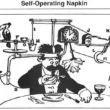On August 12, 2005, I launched an offensive to expose crimes and corruption on Wall Street that I believed were leading to the destruction of dozens (perhaps hundreds) of companies, the loss of countless jobs, the theft of billions of dollars, and quite possibly, a systemic meltdown. I did this with a webcast I called, “The Miscreants’ Ball”.
In this offensive, which I have called a “mitzvah”, “crusade”, and (when speaking of how my opponents view it) a “jihad”, I alleged that:
1) The SEC had grown inappropriately close to Wall Street (which SEC Senior Investigator Gary Aguirre and a Senate Judiciary Committee report have since confirmed);
2) The New York state Attorney General Eliot Spitzer was a corrupt finger-puppet (subsequent events have confirmed the corruption, and I am waiting for anyone in the press to see the “finger-puppet” implication of Spitzer’s favorite girl, Ashlee, living rent-free in the summer home of Spitzer’s biggest donor, Jim Chanos);
3) Certain hedge funds had grown inappropriately close to certain journalists of the financial press (which CNBC’s own Jim Cramer has since confirmed);
4) As a result of the indolence of the SEC, New York Attorney General, and financial press, a circle of hedge funds were taking down companies through:
- naked short-selling (which SEC Chairman Chris Cox has since confirmed);
- class action lawsuits by Milberg Weiss (which a DOJ indictment and a stack of convictions has since confirmed);
- “independent research” which was in fact bought-and-paid for (to which I already had a stack of affidavits attesting).
I hope, then, dear reader, that I do not assume too much when I write: perhaps in retrospect these claims are not so improbable as they may have first sounded.
The afternoon of my Miscreants’ Ball presentation, I was invited to go onto CNBC to be interviewed by Ron Insana, and the spinning began. Over time, that spin-job would be composed of at least five elements:
1) Referring to the Overstock suit against Rocker and Gradient as being about short-selling while glossing over the allegations regarding an inappropriate relationship between Rocker and the putatively independent research house (e. g., letting Rocker order, edit, preview, and front-run the reports on Overstock.com);
2) Referring to the case against David Rocker as being about naked short selling, when in fact the suit did not mention naked short selling;
3) Continuously failing to distinguish between short selling and naked short selling (which is like failing to distinguish between sex and sexual harassment);
4) Relying upon the preceding vaguenesses in support of a cover-up, that cover-up being that this was simply a fight about short selling, and which insisted upon the benefits of short selling (without distinguishing it from the illegal offshoot);
5) Overstock was not a good company, and therefore none of my claims about the capital markets could be true. (Yes, it is an obvious non sequitur, but not so obvious that it was not blindly parroted by more or less the entirety of the New York financial press, without a trace of critical thinking regarding its logic.)
The obfuscation that began in this interview would in time become a roar.



